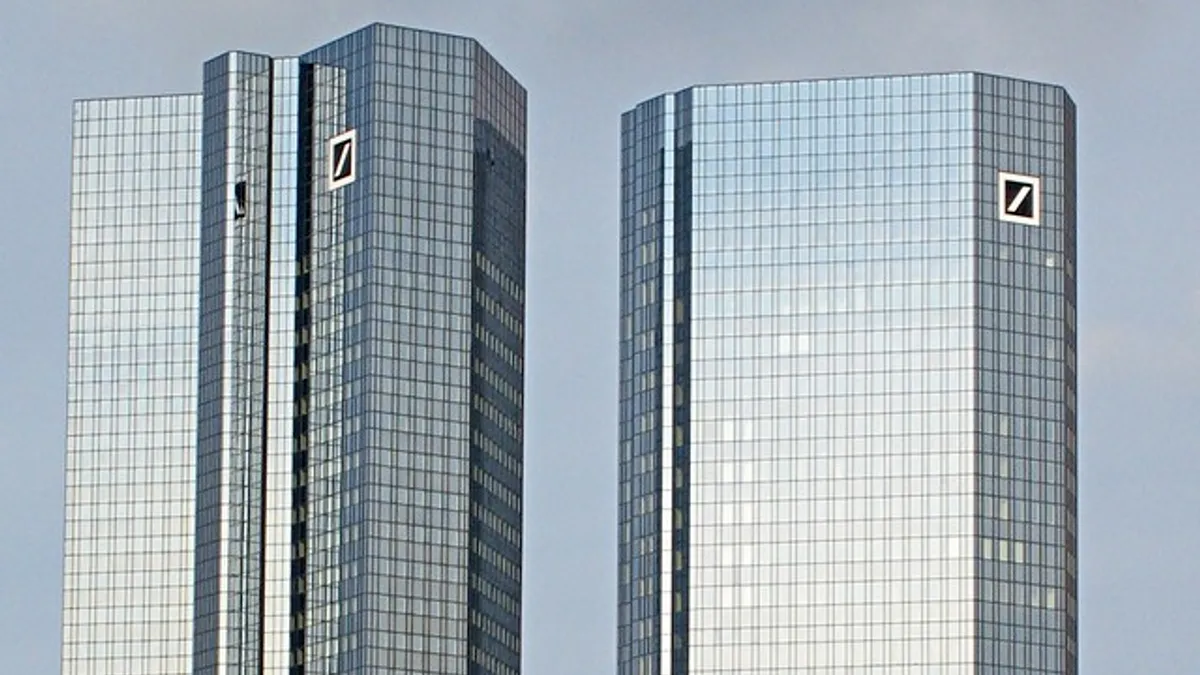Dive Brief:
- Deutsche Bank will pay more than $87 million to settle allegations it violated anti-bribery laws by using middlemen and hiding payments, and an additional $43 million to resolve a separate investigation by the Securities and Exchange Commission (SEC) into alleged commodities fraud, the Justice Department said in a release Friday.
- Prosecutors, in court documents unsealed Friday, accused the German lender of falsifying records of payments it made between 2009 and 2016 to business development consultants — middlemen, in short — in Saudi Arabia, the United Arab Emirates (UAE), Italy and China to help the bank win clients.
- Through a deferred prosecution agreement, the bank admitted wrongdoing but won't face criminal charges as long as it obeys certain terms for three years, though neither the bank nor the DOJ detailed those requirements.
Dive Insight:
"Deutsche Bank engaged in a seven-year course of conduct, during which it failed to implement a system of internal accounting controls regarding the use of company funds and falsified its books and records to conceal corrupt and improper payments," Robert Zink, acting deputy assistant attorney general of the Justice Department's Criminal Division, said in a statement. "This resolution exemplifies the department's commitment to help ensure that publicly traded companies devise and implement appropriate and proper systems of internal accounting controls and maintain accurate and truthful corporate documentation."
Deutsche Bank spokesperson Dan Hunter told Bloomberg the German lender has taken "significant remedial actions," investing more than €1 billion ($1.22 billion) in data, technology and controls, improving its training, and boosting its financial-crime fighting workforce to more than 1,600.
"While we cannot comment on the specifics of the resolutions, we take responsibility for these past actions, which took place between 2008 and 2017," Hunter said in a statement. "Our thorough internal investigations, and full cooperation with the DOJ and SEC investigations of these matters, reflect our transparency and determination to put these matters firmly in the past."
In the DOJ case, prosecutors accused Deutsche of concealing bribes to a client's decision maker in Saudi Arabia and hiding millions of dollars in payments to a third party in Abu Dhabi. The bank also falsely recorded payments to an Italian regional tax judge whom it used to attract clients.
The bank also hired a consultant in China who was a close friend of an official tied to the setup of an investment fund, prosecutors said. Deutsche paid the consultant at least $1.6 million without fully documenting his services or reviewing invoices he submitted for gifts and entertainment for government officials, The Wall Street Journal reported, citing the SEC.
Banks have come under fire for sometimes using a web of intermediaries to win work. In perhaps the best-known recent case involving alleged bribery and business development, Goldman Sachs last year agreed to pay more than $5 billion to enforcement agencies in five countries to resolve its long-running 1MDB scandal.
Deutsche itself has a history of anti-bribery case settlements with the SEC. The bank agreed to pay $16.2 million in 2019 to resolve charges from the regulator that it violated the Foreign Corrupt Practices Act by hiring unqualified relatives of government officials in China and Russia to win or retain business.
In a separate case, Deutsche Bank traders in New York, Singapore and London between 2008 and 2013 placed orders to buy and sell gold and silver futures contracts with the intent to cancel those orders before execution, according to court documents — a scheme known as spoofing.
Deutsche Bank agreed was fined $7.5 million to resolve those allegations, but the DOJ waived $5.6 million the bank paid as part of a 2018 settlement. Four former traders were convicted of wire fraud in September in connection with the case.
Regulators have ramped up their penalties for spoofing in the past year. JPMorgan Chase in September agreed to pay $920.2 million to settle allegations the bank manipulated the precious metals and Treasury markets over eight years. A month earlier, Scotiabank agreed to pay $127.4 million to resolve criminal charges related to a precious metals futures contract price manipulation scheme.














